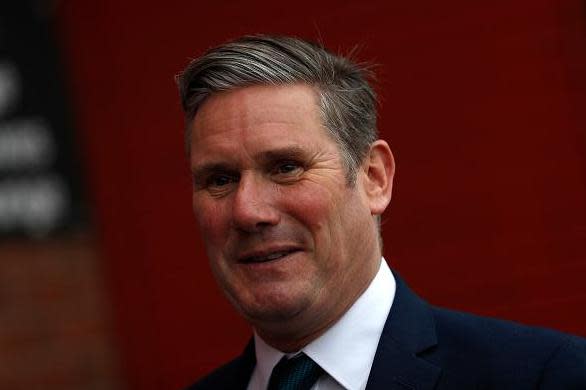Keir Starmer calls for schoolchildren to be taught more about Britain’s black history

Sir Keir Starmer will call for children to be taught more about Britain’s black history in school to give them "a full understanding of the struggle for equality".
The Labour leader will say the school curriculum should be made more diverse during a visit to the Museum of London with shadow equalities minister Marsha de Cordova, marking the start of Black History Month.
He said, in comments released prior to his visit: “This month we celebrate the huge achievements of Black Britons and the Black community. But Black British history should be taught all year round, as part of a truly diverse school curriculum that includes and inspires all young people and aids a full understanding of the struggle for equality."
“While some schools are already doing this, the government should ensure all students benefit from a diverse curriculum.”
Ms De Cordova echoed this, saying: "If we want to be a progressive society then we really should be looking at ensuring that our history, black history, which is British history, is part of the curriculum."
Black history is British history.
It must be taught and celebrated in our schools.#BlackHistoryMonthpic.twitter.com/vxUrsA6AE3— Keir Starmer (@Keir_Starmer)
The education charity Teach First has reported that pupils could graduate from secondary school without having studied a single literary work by a non-white author.
The debate over whether the curriculum should better represent black Britons has raged for decades. In 1999, The Macpherson report into the murder of Stephen Lawrence urged that “consideration be given to amendment of the national curriculum aimed at valuing cultural diversity and preventing racism, in order better to reflect the needs of a diverse society”.
The Windrush “lessons learned” review, published more than 20 years later, said “the Windrush scandal was in part able to happen because of the public’s and officials’ poor understanding of Britain’s colonial history, the history of inward and outward migration, and the history of black Britons”.
Ms De Cordova said: “The Black Lives Matter movement shone a light on racism in the UK and around the world. One way for the government to act would be to ensure that young people learn about Black British history, colonialism and understand Britain’s role in the transatlantic slave trade. Black history is British history.”
At Prime Minister’s Questions on Wednesday, Sir Keir urged Boris Johnson to launch and inquiry into racial inequalities, in particular the “truly shocking” statistic that black women are five times more likely to die in pregnancy and childbirth than white mothers.
Mr Johnson replied: “This government has launched an urgent investigation into inequalities across the whole of society, and we will certainly address them in a thoroughgoing way, and I am amazed that he seems ignorant of that fact.”
Sir Keir’s spokesman later described that response as “disappointing and dismissive”, adding: “We do hope he will take this issue seriously.”
The Labour leader has faced calls from some in his party party to take a more vocal stance on BAME issues since global Black Lives Matter protests broke out following the death of George Floyd.
He and his deputy Angela Rayner were photographed taking the knee in solidarity with the movement, but he dismissed some protesters’ calls to “defund the police” as “nonsense”.
He also said he did not agree with some actions done in protest, including the toppling of the statue of slaveowner Edward Colston in Bristol.
He said at the time: “Stepping back, that statue should have been taken down a long, long time ago. We can’t, in 21st-century Britain, have a slaver on a statue.”
But he insisted: “It shouldn’t have been done in that way, completely wrong to pull a statue down like that. That statue should have been brought down properly, with consent, and put, I would say, in a museum.”
The Labour leader also expressed regret for referring to Black Lives Matter as a “moment” in an interview.
Read more
Starmer mocks Johnson for 'not understanding' his coronavirus rules

